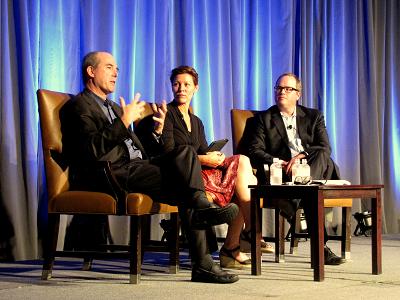In a panel at “The Radio Show” last week about mobile apps, moderator Steve Goldstein asked a question about podcasting and who is doing a good job in this area. Noting that NPR and public radio have excelled in the space, he wondered whether commercial radio has experienced similar success.
And Steve’s question speaks volumes about public radio’s consistent ability to create content that is podcast-worthy. At the Public Radio Program Directors conference in Las Vegas the prior week, a session called “The New Guys: Chief Content Officers” explained why.
Featuring the heads of content at NPR/Kinsey Wilson (left) and American Public Media/Dave Kansas (right), the panel offered incredible insights about how media and technology advances are impacting the creation of content. It was a great opportunity to get schooled by two of the smartest guys working in radio who oversee complex organizations that are producing incredible content.
Like their counterparts in commercial radio, they are grappling with some of the same issues, notably the integration of digital channels and platforms, competing in a more dynamic environment, trying to find efficiencies, and evaluating their available talent while evaluating how to attract qualified new producers.
I’m going to include a Part 2 of this post tomorrow, but for today I thought I’d provide a few key high points that speak about the overall media environment along with priorities of where we go from here. Moderated ably by New Hampshire Public Radio host Virginia Prescott, here were some of the best quotes that came out of this session:
Wilson: Radio isn’t going away. Radio’s going everywhere.
Kansas: You have to be able to compete against the best whether it’s music or news.
Wilson: Change happens a lot faster than you think.
Kansas: High quality content will burn through the chaos.
Chew on those pearls, but consider Wilson’s four areas of focus at NPR because they say a great deal about his approach – and maybe yours:
- Audio first
- Both mobile and broadcast
- Quality is essential
- A compelling experience
In explaining his Big 4, Kinsey noted that audio is the sweet spot – the key reason why it tops his list. Making sure that NPR creates great content for both mobile and broadcast comes next. As for quality, it’s been an NPR value since Day One, but as he noted, “the Internet is a flight to quality.” Consumers have so much available and they are developing their own ways of searching for what’s best.
And finally, this notion of creating compelling experiences for listeners. As Kinsey pointed out, it is no longer sufficient to simply provide the best content – it needs to be melded into creating memorable and essential moments for consumers. Obviously, this is where mobile and social provide new dimensions in experiencing and enjoying audio programming that people appreciate and value.
Tomorrow, more insights from these public radio “content kingpins.”
Thanks to PRPD for the photo.
- Media And Technology In 2025: Believe It Or Not! - April 18, 2025
- In Radio, You Just Never Know - April 17, 2025
- The Secret To Making A Great Podcast (And Great Radio) - April 16, 2025





I’m glad you are covering this interesting conversation.
Just a brief comment on the sentence “As Kinsey pointed out, it is no longer sufficient to simply provide the best content – it needs to be melded into creating memorable and essential moments for consumers.”
I would question the “no longer” part of it. That implies we used to be able to just provide good content succeed. If we take “good content” to mean the assemblage of facts, sources, etc., that has NEVER been enough to be successful.
What the best of public radio (and the best of other radio) has always done is put content together and deliver it in a way that resonates with audiences. That’s what the PRPD “Core Values” describe – Qualities of the Mind, Heart and Spirit (see https://www.prpd.org/Files/pubnewsinfotalkvalues.pdf)
The experiences that bond audiences to our service (“Driveway moments”) always transcend the “facts” in the story. All that has changed is that with new media options we need to learn what different methods, if any, are required to deliver the equivalent in the new forms – and what is enduring that will make that task much easier.
Thanks, Arthur, for your insightful comments – and for putting together this session. (For those of you who may not know, Arthur Cohen heads up PRPD.) You are correct that public radio has become famous for over-reaching, even more noticeable in today’s over-cluttered environment. Appreciate you taking the time to chime in.